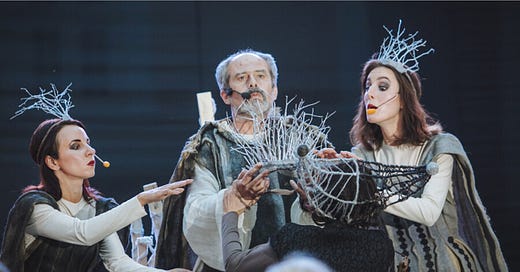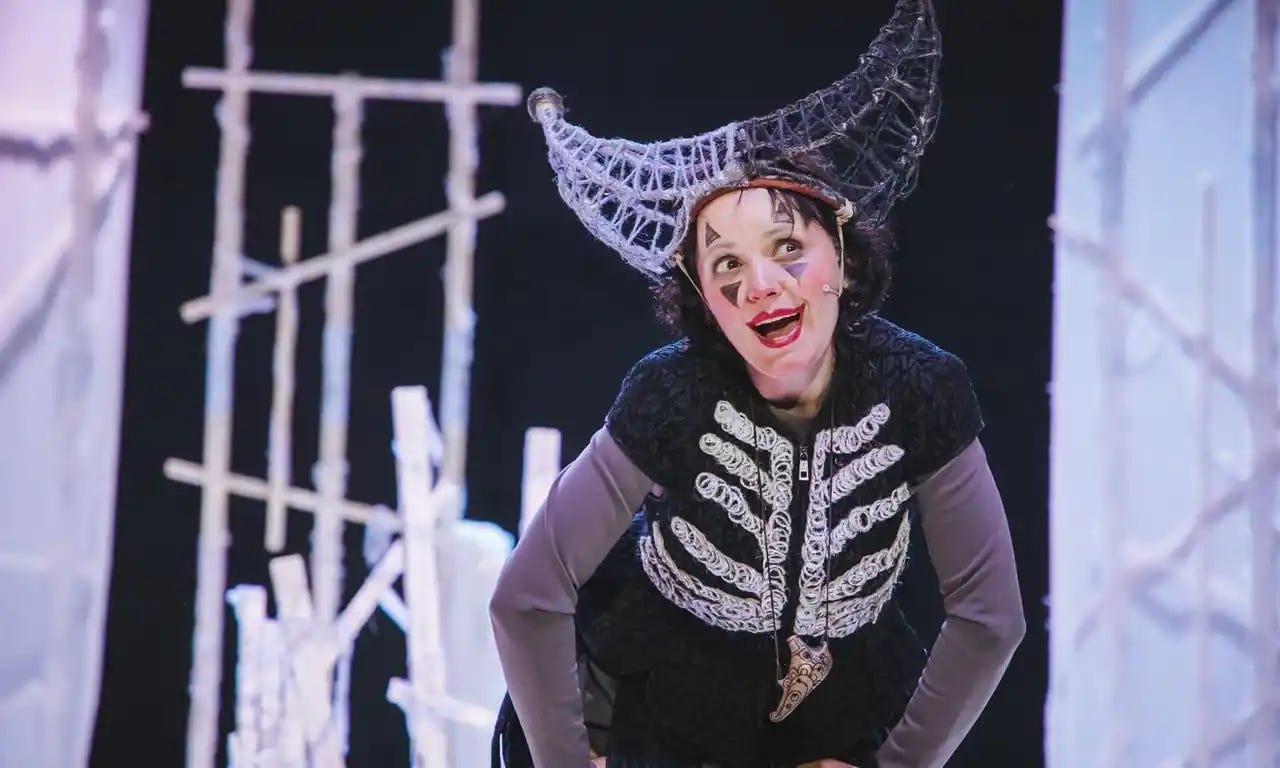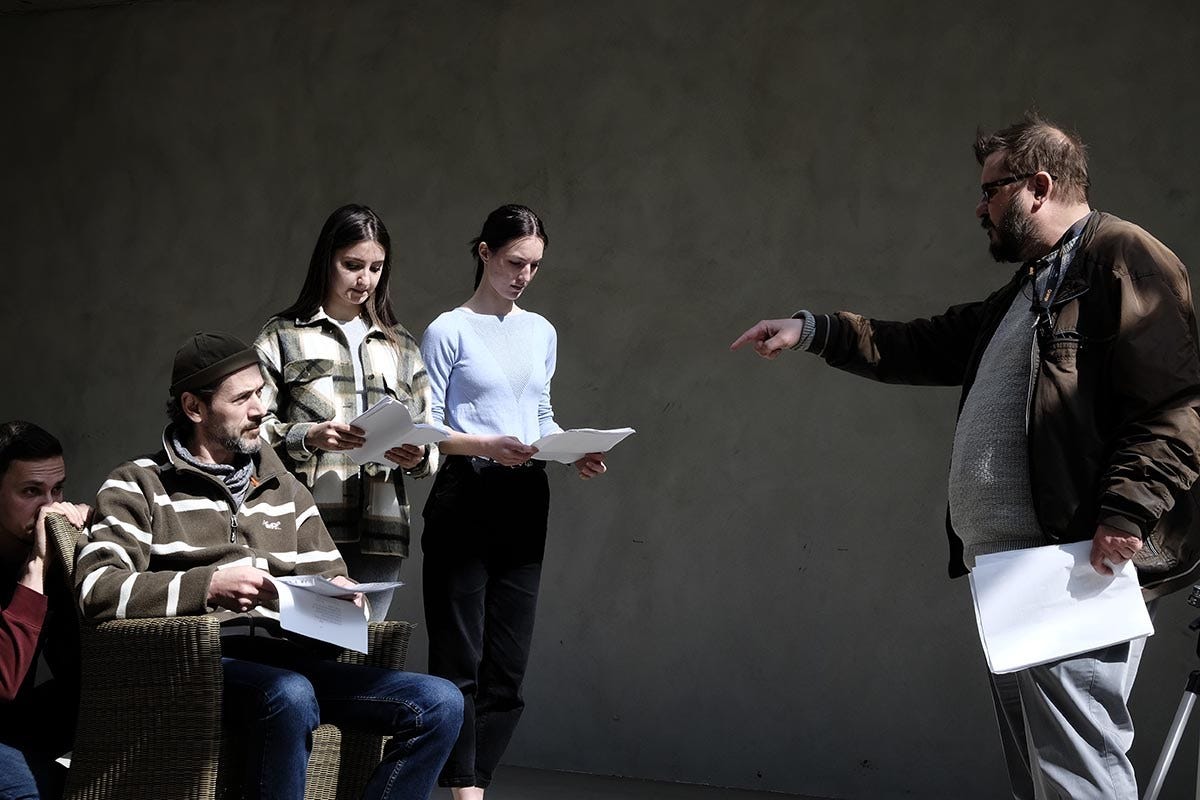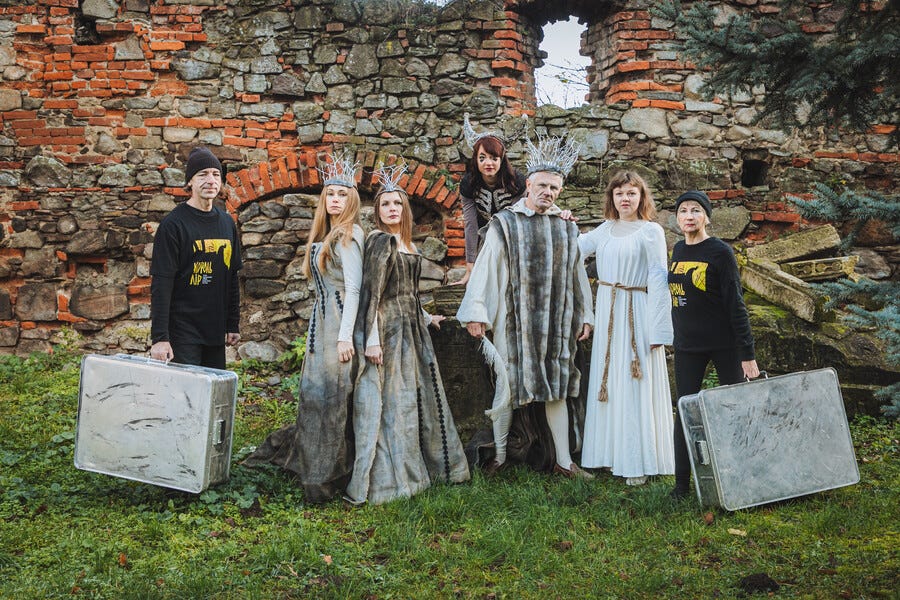From Uzhhorod to Stratford-upon-Avon: King Lear as a labour of love
On how an amateur production of King Lear found its way from Ukraine to the UK.
Hello, this week I’m in Slovenia (again), where I’m on the jury at the Maribor Theatre Festival, the annual showcase of the best Slovenian theatre of the last year which takes place in the country’s picturesque, if dinky, second city. Two nights ago I watched a six-hour production of Angels in America (this production in fact), in which the actors ended up performing the last scene outdoors in a thematically appropriate deluge. I’ll be writing about the work I’m seeing here in future editions.
This week’s newsletter, however, looks at a pretty remarkable production of King Lear which is coming to Stratford-upon-Avon in the UK this week.
Here comes the weird transactional bit. If you find this newsletter interesting or valuable, please consider sharing it with other people who might enjoy it or, if you or your organisation are able, becoming a paid supporter. There are quite a few of you now, which is lovely.
Uzhhorod, a small city in western Ukraine close to the border with Slovakia, has become a hub for internally displaced people following the Russian invasion of Ukraine in 2022. As waves of people arrived in the city, various initiatives were set up to help those who had been forced to leave their homes and who suddenly found themselves in temporary accommodation a new city.
Vyacheslav Yehorov decided to realize a long-held dream of his, to stage King Lear, inviting recently displaced people to audition for the performance. Over 60 people ended up auditioning his production, from a variety of backgrounds, some with ambitions to act, but most with no background in performance, many looking for any form of creative outlet, or simply for distraction, at a time of great upheaval in their lives. As one woman says during the audition process, she used to put things off for tomorrow, now she lives.
The journey of this show to the stage was documented in the film King Lear: How We Looked for Love during the War, by filmmaker Dmytro Hreshko. This week, on 14th-15th June, audiences in Stratford-upon-Avon in the UK will get the opportunity to see the performance at the Royal Shakespeare Company’s studio, The Other Place.
King Lear, says Yehorov, is “the greatest tragic masterpiece in the world.” It was the subject of his university thesis and he always hoped to stage it. It wasn’t enough to simply write about the play, he needed to bring it to life.
Looking for Lear
Locating their Lear was relatively straightforward. Oleksiy Dashkovskii, originally from Irpin, came to Uzhhorod after his home was shelled. “A missile landed in his kitchen,” explains Yehorov. Dashkovskii describes his escape to Uzhhorod in the documentary, leaving his home behind on a bus crammed with people and their pets. The English language teacher was one of the only men of suitable age to audition. He seems a good fit, combining gravitas with an edge of playfulness. He will not be performing in the UK however, because of his age - he is 56 years old and was concerned about the implications of crossing the border because of Ukraine’s new mobilization law. Andrii Khomik, a professional violinist from Yalta in Crimea who hadn’t acted before he joined the company in 2023, will play the role.
For obvious reasons the majority of those who auditioned were women, though in the documentary we also see a boy of 17, who fled Kyiv alone with his younger brother, trying out for a part. At the time the film was shot, many of the cast were still living in Uzhhorod’s Palace of Children and Youth, which had been turned into a refuge, with people sleeping on the floor. The show was also being rehearsed in the building, “which made things convenient,” says Yehorov pragmatically.
Hreshko had been living in Kyiv when the invasion began and was himself also displaced. He started to shooting footage of the volunteer movement, focusing on Yehorov’s production.
His film documents different people trying out for the role of the Fool. Eventually the role went to Ruslana Tumofii from Lozova in the Kharkiv region. She has a wonderful impish, almost Puck-like quality. She has since returned home with her family. In Stratford Olena Aliabieva, from Kharkiv, will play the Fool, having played Regan at the premiere. This versatility and flexibility is an essential facet of their company, says Yehorov, a consequence of the inherent instability of making art in a time of war with people who have been displaced from and are eager to return to (what’s left) of their homes. You need to be nimble in such circumstances. Yehorov has had to use doubling and switch some of the scenes around between the characters. Perhaps unsurprisingly, the suitcase is a key motif in his production which starts with the characters arriving by train from different cities.
Yehorov had been working at a film school, a space where children could go to watch movies, before the invasion. This was then repurposed into a refugee hub. He clearly believes in art’s therapeutic value. “We need to produce more love in our hearts,” he says, in order to counteract the destruction. War is spiritually and emotionally destructive, he explains. It’s important to hold onto your capacity for love (hence the title of the documentary: How We Looked for Love during the War).
While King Lear is a tragedy, it’s not comparable to the tragedy unfolding in their country. “A tragedy on paper, that’s one thing, but a tragedy in real life is absolutely different,” he says, His production is not a production about war; it exists in spite of the war. It’s a small act of resistance. Yehorov talks about this as the show’s – and his – mission. “We need to focus on breaking that negativity, and putting our thoughts and efforts into positivity, into good things.”
When the show premiered in 2022, he says, “the audience was very emotional. People were crying after the performance. People were hugging us. They were so happy that we did such a thing.”
The show proved so popular they were able to tour it to other cities in Ukraine, but this is the first time it will be performed outside the country.
How did this production, by a non-professional company in a small city in Ukraine, find its way to Stratford? Yehorov’s wife Yulia, who is also the show’s producer, was in a café in Uzhhorod, when she ran into a man from the UK, a volunteer working with disabled people who also happened to be from Stratford-upon-Avon. While she speaks French but little English, and he spoke little French, they somehow managed to discuss the production. Yehorov is still a little puzzled to how they managed to have this conversation.
When he returned to the UK, he approached producer Zoe Donegan with the idea of bringing the production of King Lear to Stratford Upon Avon. The production now forms part of Tamara Harvey and Daniel Evans’ inaugural season as joint artistic directors of the RSC. “Their performances will be a testament to the power of Shakespeare, and to how his work crosses borders, cultures and generations,” they said. “What better way to demonstrate that than to invite this amazing company of actors that got together during the conflict who said the spirit of Shakespeare kept them alive. It's incredibly moving to us that our in-house playwright has clearly spoken to this community and its out privilege to welcome them to Stratford."
Speaking to Yehorov via a translator, I was reminded of the work that Belarus Free Theatre are doing with displaced Belarusian and Ukrainian teenagers in Warsaw. Many of these kids had been forced to move twice, first because of Lukashenko’s crackdown in Belarus and then from Ukraine after Putin’s invasion. Belarus Free Theatre, many of whom had also ended up in Warsaw, set up the Free Artist school for young people. This was originally intended simply to give the teenagers the means to express themselves, but eventually led to the creation of a piece of devised performance, overseen by the company’s managing director, Svetlana Sugako, in which they explored not just their experience as refugees (if anything this was only lightly touched on), but all their anxieties, concerns, and frustrations, especially the pressure they felt to do well in school and their relationship with their parents. The process of making the show was clearly immensely therapeutic and when their parents saw the show, some decided to make their own theatre piece in response. (I wrote about this project for The Stage last year).
Watching these shows - the teenagers’ show and their parents’ follow-up - in Warsaw was an incredibly moving experience for everyone, performers and audience both (my translator was sobbing, everyone was sobbing). The focus of the art they created together was not war, not political oppression, but about families and their complexities, and about love – which also feels true of Yehorov’s work.
A kind of catharsis
Despite the choice of play, Yehorov is clear that is production is not a downer. Many people told him that they had been expecting to see something dark and depressing, he says, but “our interpretation is very warm. It’s the opposite; it's not dark.” For both those performing and those watching “there was a kind of catharsis.” While they’re in the UK, the company will meet with representatives from internationally displaced people’s groups across Warwickshire who will be given the opportunity to watch a performance ahead of the public opening.
The film contrasts scenes of the cast rehearsing with shots of shattered buildings, homes reduced to debris. “Lear has lost everything and so have these people,” Yehorov says at one point in the documentary, in discussion with his professor who is sitting in on the auditions, "but they have not lost their humanity.” One of the young women auditioning becomes emotional and when she apologises for crying, she is quickly reassured by the three men auditioning her. Her tears set them all off. If you don’t cry, you go numb, they tell her. That’s why they’re doing this, to give people that outlet.
While the company is excited to come to Stratford and perform Shakespeare in his home town, this is obviously tempered by the fact that the war is ongoing, with no end in sight. This takes a toll, inevitably. “We are exhausted,” he says.
This week in European theatre
A round-up of festivals, premieres and other upcoming events over the next seven days.
Sancta – Florentina Holzinger’s new work, based on Paul Hindemith's one-act opera, is one of the hottest tickets at this year’s Wiener Festwochen. This piece in the Guardian goes deep on the show’s creation, which involves roller-skating nuns and lots of nudity. It runs until 15th June in Vienna’s Museum Quartier, though it’s pretty much sold out.
Cork Midsummer Festival – Highlights from the annual Irish summer festival of theatre, dance and music include Tempesta, in which playwright Deirdre Kinahan collaborates with Steve Wickham of The Waterboys, and Good Sex, a show co-created by the acclaimed Dead Centre and the writer Emilie Pine for a show that features two actors, neither of whom have previously read the script and an intimacy coordinator. The festival runs from 12th – 23rd June
Reykjavik Fringe Festival – The Icelandic fringe festival, part of the wider Nordic Fringe Network, has been running since 2018 and includes a programme of theatre, dance, circus, comedy, drag, and all manner of other stuff from both local and international artists. It runs between 17th-23rd June.
Thank you for reading! You can contact me about anything newsletter-related on natasha.tripney@gmail.com







